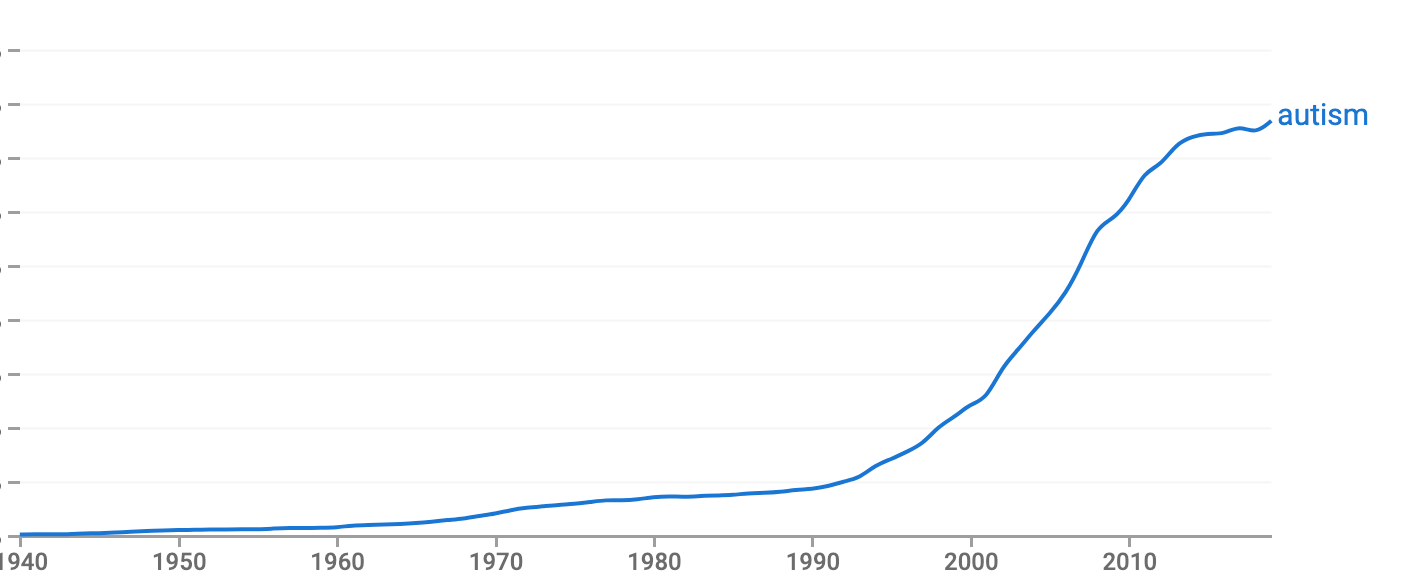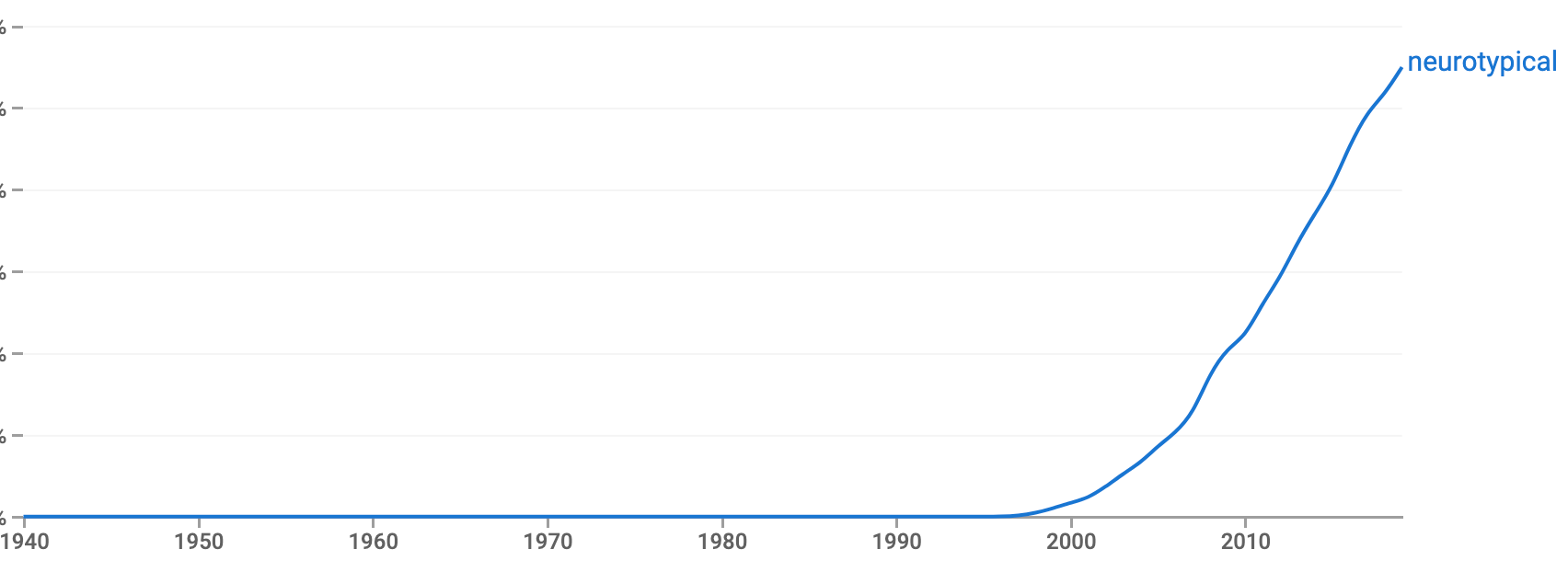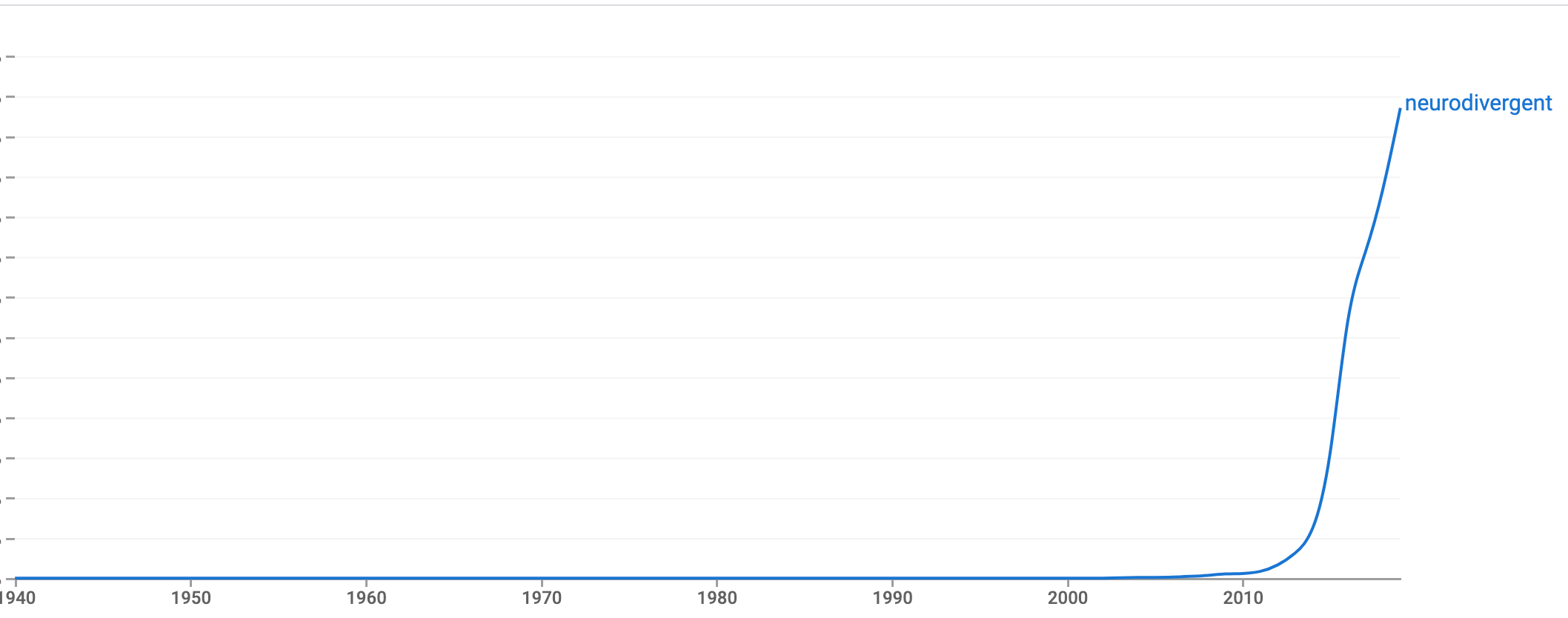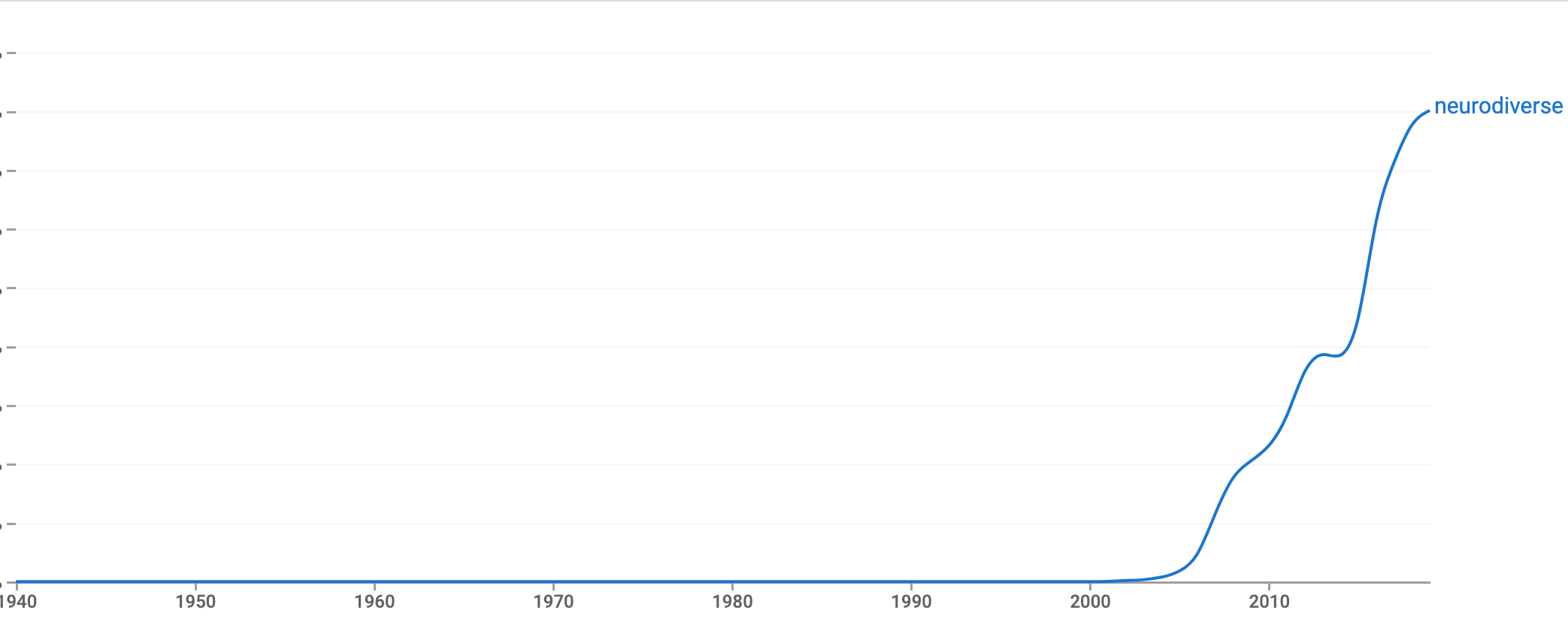Some new words
« previous post | next post »
Over the past few months, several of the leading characters in the Dumbing of Age webcomic have discovered that they are (or might be) autistic, in diverse ways, joining Dina who was always portrayed with stereotypical symptoms.
The reveal for Joyce came in the strip for 6/6/2022, and some of the ensuing discussion showed how new related terminology is spreading. Here's the strip for 6/23/2022, where Joyce enlightens Jennifer/Billie (click to embiggen):
These developments reflect wider changes in space and time — starting with the steadily increasing prevalence of the word autism and its diagnostic application. We can track the word's prevalence via Google Books ngrams:
Here are per-decade counts for autism from COHA (word counts), the NYT (story counts) and Google Scholar (article counts):
| 1960s | 1970s | 1980s | 1990s | 2000s | 2010s | |
| COHA | 7 | 3 | 6 | 32 | 117 | 295 |
| NYT | 23 | 58 | 107 | 249 | 1391 | 2019 |
| Google Scholar | 3000 | 7,860 | 15,100 | 34,300 | 240,000 | 705,000 |
(From 1/1/2020 to today, the NYT finds 494 stories using the word autism, and Google Scholar finds 62,800 articles.)
The ngram graph for neurotypical follows autism after a bit of delay, but even more steeply (though of course at a lower overall rate):
The per-decade counts from COHA, the NYT, and Google Scholar show the same pattern:
| 1960s | 1970s | 1980s | 1990s | 2000s | 2010s | |
| COHA | 0 | 0 | 0 | 0 | 1 | 3 |
| NYT | 0 | 0 | 0 | 0 | 11 | 56 |
| Google Scholar | 2 | 5 | 5 | 25 | 1,300 | 16,100 |
(From 1/1/2020 to today, the NYT finds 34 stories using the word neurotypical, and Google Scholar finds 15,100 articles.)
The word neurodivergent has also risen steeply, but about a decade behind neurotypical:
The per-decade counts:
| 1960s | 1970s | 1980s | 1990s | 2000s | 2010s | |
| COHA | 0 | 0 | 0 | 0 | 0 | 0 |
| NYT | 0 | 0 | 0 | 0 | 0 | 4 |
| Google Scholar | 0 | 0 | 0 | 0 | 56 | 864 |
(From 1/1/2020 to today, the NYT finds 22 stories using the word neurodivergent, and Google Scholar finds 3,290 articles.)
Perhaps Joyce should have chosen neurodiverse instead of neurodivergent. Her choice is less negative than Jennifer's term "weirdo", or the more formal "abnormal". But the connotations of "divergent" are not far from those of "weirdo". And the uses of neurodiverse went up earlier and faster than those of neurodivergent:
| 1960s | 1970s | 1980s | 1990s | 2000s | 2010s | |
| COHA | 0 | 0 | 0 | 0 | 0 | 1 |
| NYT | 0 | 0 | 0 | 0 | 2 | 5 |
| Google Scholar | 0 | 2 | 4 | 12 | 125 | 2240 |
(From 1/1/2020 to today, the NYT finds 16 stories using the word neurodiverse, and Google Scholar finds 4,330 articles.)
And the other day, one of my clinical colleagues suggested the term neuroexpansive, which is not yet known to Google Books ngrams or the NYT, but does have one current hit on Google Scholar.
[For a more fundamental critique of "autism" and other diagnostic categories as natural kinds, see "Grouping-think", 6/9/2022.]





Philip Taylor said,
October 18, 2022 @ 6:29 am
I found bubble two ("I'm definitely not, but I can give you my expert advice from a not-autistic person to, yeah, maybe ask somebody who is.") exceptionally difficult to parse. Given the start ("I'm definitely not, but I can give you my expert advice from a not-autistic person"), I fully expected the follow-up ("to, yeah, maybe ask somebody who is") to end with a person, not a task. My italics, indicating the reason for my difficulty — advice from someone to not someone, but instead something.
Haamu said,
October 18, 2022 @ 4:54 pm
See also neuroinclusive, neuronormative, neuroqueer, etc.
AntC said,
October 19, 2022 @ 8:31 am
The psychobabble that I've noticed on the rise is 'narcissism'. The U.S. is of course barely in remission from the narcissist-in-chief. But the -ism seems to be bandied-about to 'explain'/blame almost any vaguely anti-social tendencies.
Or am I deluding myself? And is narcissism to blame?
(I'm not very inclined to apologize for "psychobabble". I've had a career in I.T. Autism (spectrum) was more or less a requirement for the job.)
Philip Taylor said,
October 19, 2022 @ 10:41 am
I don't know whether it would qualify as "psychobabble", but the word that I seem unable to avoid these days is "nuanced". Everything is "nuanced" these days, or so it would seem …
MarkB said,
October 21, 2022 @ 1:35 pm
"The psychobabble that I've noticed on the rise is 'narcissism'. The U.S. is of course barely in remission from the narcissist-in-chief …"
And he/she didn't even notice. I'm sure there's a word for that.
Michael M said,
October 24, 2022 @ 2:59 pm
I am genuinely struggling to parse this comic. Are Billie/Jennifer the same person? Multiple personalities, maybe, which is somewhat trendy at the moment? And what does the third panel mean?
'She was always trying to be helpful, but in a way where she'd kinda botch it and make you feel better about yourself.'
Surely the latter should be feel _worse_. Or was she actively trying to make the autistic character feel worse, and therefore botched it by making her feel better? Am I misparsing the sentence? And are we talking about the interlocutor, another personality of the interlocutor, or a third party? I'm baffled.
E said,
October 29, 2022 @ 2:52 pm
Neurodiverse and neurodivergent mean different things. A workplace is neurodiverse when they have people with different neurotypes working there. Some could be neurotypical, some could be autistic, some ADD, some bipolar. People with neurotypes that diverge from the norm are neurodivergent, but they're not individually neurodiverse. What neurodivergent people want is for the neurodiversity that is inherent in the world to be accepted.